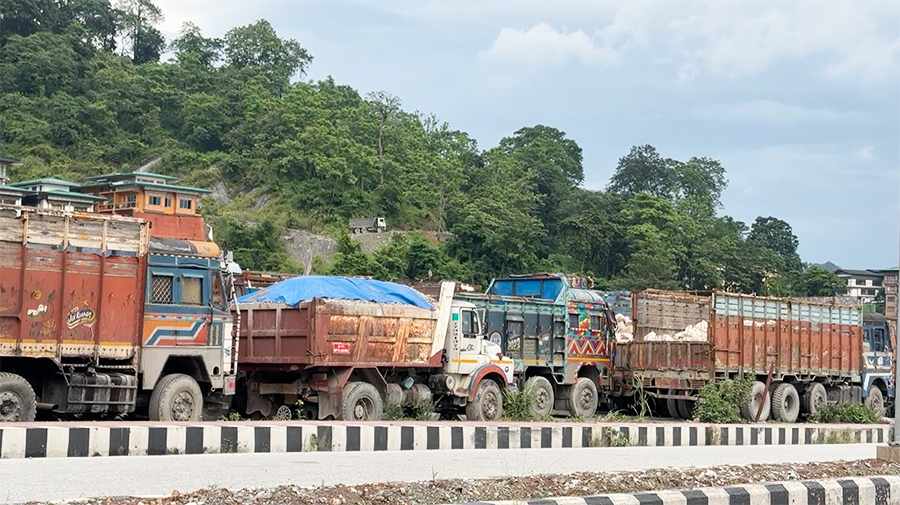 Boulder exports to Bangladesh through Fulbari in India have again faced disruptions. Protests by local groups last Sunday brought trade to a complete halt for a day. Although partial movement has resumed, frequent disruptions continue to affect business. Frustrated Bhutanese exporters are now urging the government to step in, saying the issue has become a constant and unresolved problem.
Boulder exports to Bangladesh through Fulbari in India have again faced disruptions. Protests by local groups last Sunday brought trade to a complete halt for a day. Although partial movement has resumed, frequent disruptions continue to affect business. Frustrated Bhutanese exporters are now urging the government to step in, saying the issue has become a constant and unresolved problem.
 Bhutan began using the Fulbari route in 2016. However, the Bhutan Exporters Association (BEA) says the route has been troubled by repeated protests.
Bhutan began using the Fulbari route in 2016. However, the Bhutan Exporters Association (BEA) says the route has been troubled by repeated protests.
According to the BEA, this is not the first time trade has been affected. In 2019, 37 Bhutanese trucks were vandalised, and drivers were reportedly assaulted. A First Information Report (FIR) was filed with the Indian police, but exporters claim no significant action was taken.
 The latest protestors are demanding that Bhutanese vehicles be completely banned from entering through Fulbari, or that all goods be shifted to Indian trucks before entering Bangladesh. Exporters say this goes against international trade norms.
The latest protestors are demanding that Bhutanese vehicles be completely banned from entering through Fulbari, or that all goods be shifted to Indian trucks before entering Bangladesh. Exporters say this goes against international trade norms.
The protestors also demand a limit of 50 Bhutanese trucks per day. The exporters called these demands unreasonable.
“When they demanded the tax last time, we could not export properly from January to April. We have been unable to pay loan and now when our exports are finally going well, they have protested again. Our country and India share very good relationship, but I don’t understand what is happening when it comes to our case,” said Tshewang Rinzin, Proprietor, New Export, Phuentshogling.
“We are facing a lot of challenges like collection of fees and protest, especially at Fulbari. They always come up with different issues to disrupt the export and I think it is now time for our government to do something,” said Tshering Nidup, Proprietor, Kinjung Tshongkhang, Phuentshogling.
“Our trade with Bangladesh has never been easy. We could not export for about three months last time due to Suvidha fee. Exports resumed after we started paying the fees but again they are coming up with some other issues. With these continuous disruptions and challenges, it is high time our government do something to facilitate trade smoothly,” said Lobzang Nima, Proprietor, Pindika Export, Phuentshogling.
Bhutanese exporters say protests at Fulbari stem from falling demand for Indian boulders in Bangladesh due to concerns over poor quality. In addition, Bhutanese trucks, being hydraulic, require no manual unloading, making them more competitive.
Currently, there are nearly 600 registered Bhutanese trucks carrying goods to Bangladesh via Fulbari, giving job opportunities to Indian drivers.
Bhutanese exporters pay around INR 2.5 M per day in Suvidha fees to the West Bengal government, almost INR 1bn annually. Bhutanese exporters pay. The Bhutanese exporters are paying INR. 12,00,000 approximately per day as a Suvidha fee to the government of West Bengal only from the Fulbari Border.
Although the Suvidha fees via Changrabandha are being paid by Indian transporters as of now but it has been added to the transportation and billed to exporters. Through Changrabandha, on an average, INR 13,00,000 is paid to the Suvidha Authority daily. A Suvidha fee is a charge imposed by the West Bengal government for facilitating the movement of trucks exporting goods to Bangladesh
Despite this, exporters said trade is still unstable due to constant new demands.
They added that without strong action from both the Bhutanese and West Bengal governments, the trade route could face an uncertain future.
Kinley Dem, Phuentshogling
Edited by Sonam Pem







